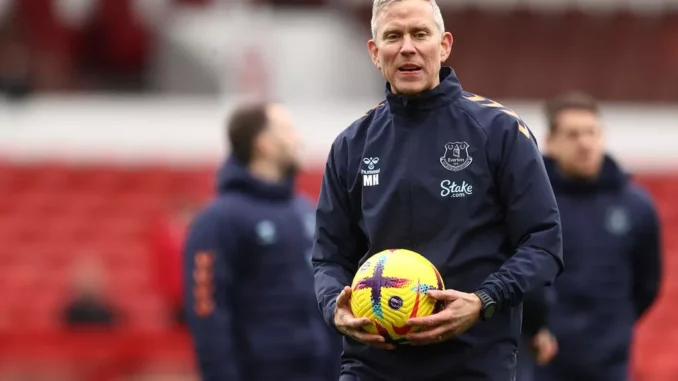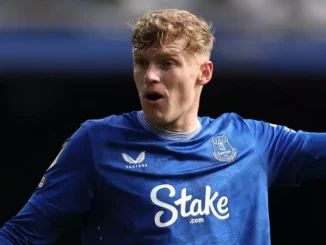
On first glance, Everton’s injury list may look daunting. While the win over Preston North End offered a confidence boost, the absence of several important players was a clear concern with just a fortnight to go before the start of the new Premier League campaign. But if you look harder, there is an argument it is evidence of a deeper, underlying, development at Finch Farm.
Sean Dyche and his coaching staff want players to speak up when they feel an issue. A big part of the behind-the-scenes work since he arrived in January 2023 has been to build a culture of trust. That means stars speaking out when they feel anything that causes them worry. The sooner a potential problem is spotted, the quicker it can be assessed and dealt with – and the smaller the risk that a minor complaint becomes a long-term injury.
Dyche insists that he does not want ‘heroes’ putting their bodies at risk at this stage of the season. It is an approach that is central to preparations for a new campaign, according to Mark Howard, the club’s head of performance.
READ MORE: Everton transfers could lead to subtle strategy shift as Sean Dyche hints at new roleREAD MORE: Everton want to fill transfer position as search for ‘top talent’ steps up
“When the gaffer says there are no heroes, he really means it,” Howard tells the ECHO. “Because if you do just feel something we have got a big group [so can deal with players being absent]. So when we’re pushing reasonably hard, we know the lads are going to get sore. The challenge is just differentiating between soreness and the edge of an injury. We have got a great collection of staff that are all working together for that – that is through the medical staff, the insights guys, the analysis staff and the sports science staff. We are talking together every day at the start and at the end, so communication and organisation is absolutely critical so that we’re all aware of the things that are going on and looking at scenarios where we do maybe just need to pull someone out of part of a session or a full session so that we know they’re ready for the next one.”
This is one of the reasons so many players miss small parts of pre-season. While Dyche is willing to push his players hard – this summer he has already put the squad through two of his notorious ‘Gaffer’s Day’ endurance programmes – he is also eager to protect them. It is why James Tarkowski flew home from the Ireland training camp at the first hint of a glute problem that ultimately kept him out for less than a fortnight. James Garner, Abdoulaye Doucoure and Seamus Coleman were described as precautionary absences at Preston while Idrissa Gueye and Iliman Ndiaye have both missed friendlies before quickly returning. Not every issue will be a small one – some of those mentioned are still being assessed and Youssef Chermiti has suffered a long-term foot injury. But every player who speaks up will have the best chance to overcome their complaint. That means creating a culture of trust that flows in both directions between staff and players.
Speaking exclusively to the ECHO, Howard explained: “It is critical the players are involved in the conversation. They are the athlete – we can’t feel what they can feel. That trust is what we’re trying to build. If you’ve got a successful team, you really want that tight trust as a group where it’s very open, it’s very honest. Honest doesn’t mean easy conversations all of the time. Sometimes the conversations are difficult – a player might be wanting to do a little bit more. We’ve got lots of information from all the different departments that will inform our decision making process, and the manager and the players and the coach and the staff are all involved in that. And then we use it wisely to make a decision on whether someone does a little bit more or does a little bit less. We’re a group of people trying to be successful, and sometimes it’s difficult conversations that are needed to do that. But generally speaking, that is what we’re trying to create here. That really strong work ethic and that real feeling of togetherness where people are very comfortable talking to each other about how they are and what they might think. And then we make a decision together rather than just telling people what they are doing.”
The most high-profile example of this approach enjoying success is the revival of Dominic Calvert-Lewin. The forward, an integral part of the Everton squad, had two injury blighted seasons before his first pre-season campaign with Dyche last summer. Injuries threatened to set him back again last August, when he missed the opening game of the campaign only to then return
and suffer a serious facial injury in a clash with goalkeeper Emiliano Martinez at Aston Villa. But when he did return he stayed fit for the majority of the season and, while his form fluctuated, his new-found resilience enabled him to find the patches of ruthlessness that played a big role in keeping Everton in the Premier League despite two unprecedented points deductions – the highlight his emphatic header in the Merseyside derby win at Goodison Park in April.
FOR MORE STORIES LIKE THIS CHECK OUR HOME PAGE



В этом источнике вы найдёте исчерпывающие сведения о партнёрской программе: 1win.
Здесь размещены все аспекты взаимодействия, критерии вступления и ожидаемые выплаты.
Каждая категория детально описан, что помогает быстро разобраться в особенностях функционирования.
Есть также разъяснения по запросам и полезные советы для новичков.
Данные актуализируются, поэтому вы доверять в точности предоставленных данных.
Источник поможет в понимании партнёрской программы 1Win.
Прямо здесь вы найдете мессенджер-бот “Глаз Бога”, позволяющий найти сведения о гражданине по публичным данным.
Сервис функционирует по фото, анализируя публичные материалы онлайн. Через бота можно получить 5 бесплатных проверок и детальный анализ по фото.
Инструмент обновлен на август 2024 и охватывает фото и видео. Бот сможет узнать данные в соцсетях и отобразит сведения мгновенно.
https://glazboga.net/
Это сервис — идеальное решение при поиске граждан удаленно.
how to get cheap clomiphene no prescription order clomiphene online get clomiphene for sale can you buy cheap clomiphene prices generic clomid c10m1d where to buy generic clomid without prescription where can i get cheap clomid pill
Прямо здесь можно получить мессенджер-бот “Глаз Бога”, позволяющий собрать всю информацию о человеке по публичным данным.
Сервис активно ищет по фото, обрабатывая актуальные базы онлайн. Благодаря ему можно получить пять пробивов и полный отчет по фото.
Инструмент обновлен на август 2024 и поддерживает аудио-материалы. Бот поможет найти профили в соцсетях и предоставит информацию мгновенно.
https://glazboga.net/
Такой сервис — идеальное решение для проверки граждан удаленно.
Здесь можно получить сервис “Глаз Бога”, что собрать всю информацию по человеку по публичным данным.
Инструмент активно ищет по ФИО, используя актуальные базы онлайн. Через бота доступны бесплатный поиск и глубокий сбор по фото.
Инструмент проверен на август 2024 и поддерживает аудио-материалы. Сервис поможет проверить личность в соцсетях и покажет сведения мгновенно.
https://glazboga.net/
Данный инструмент — помощник при поиске граждан через Telegram.
Здесь вы можете найти самыми свежими новостями страны и зарубежья .
Информация поступает без задержек.
Представлены видеохроники с ключевых точек.
Экспертные комментарии помогут получить объективную оценку.
Все материалы доступны бесплатно .
https://ulmoda.ru
Searching for latest 1xBet promo codes? This site offers verified promotional offers like GIFT25 for registrations in 2025. Get €1500 + 150 FS as a welcome bonus.
Use trusted promo codes during registration to maximize your rewards. Benefit from risk-free bets and special promotions tailored for casino games.
Discover monthly updated codes for global users with fast withdrawals.
Every promotional code is tested for accuracy.
Grab exclusive bonuses like GIFT25 to double your funds.
Active for first-time deposits only.
https://crypto.stackexchange.com/users/132697/c%c3%b3digo-promocional-1xbet?tab=profile
Enjoy seamless rewards with easy redemption.